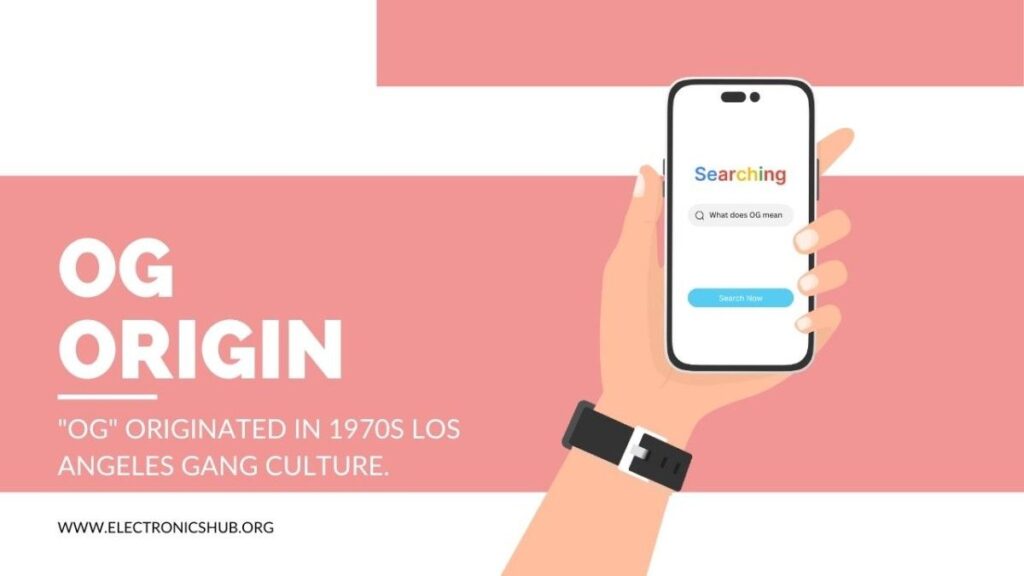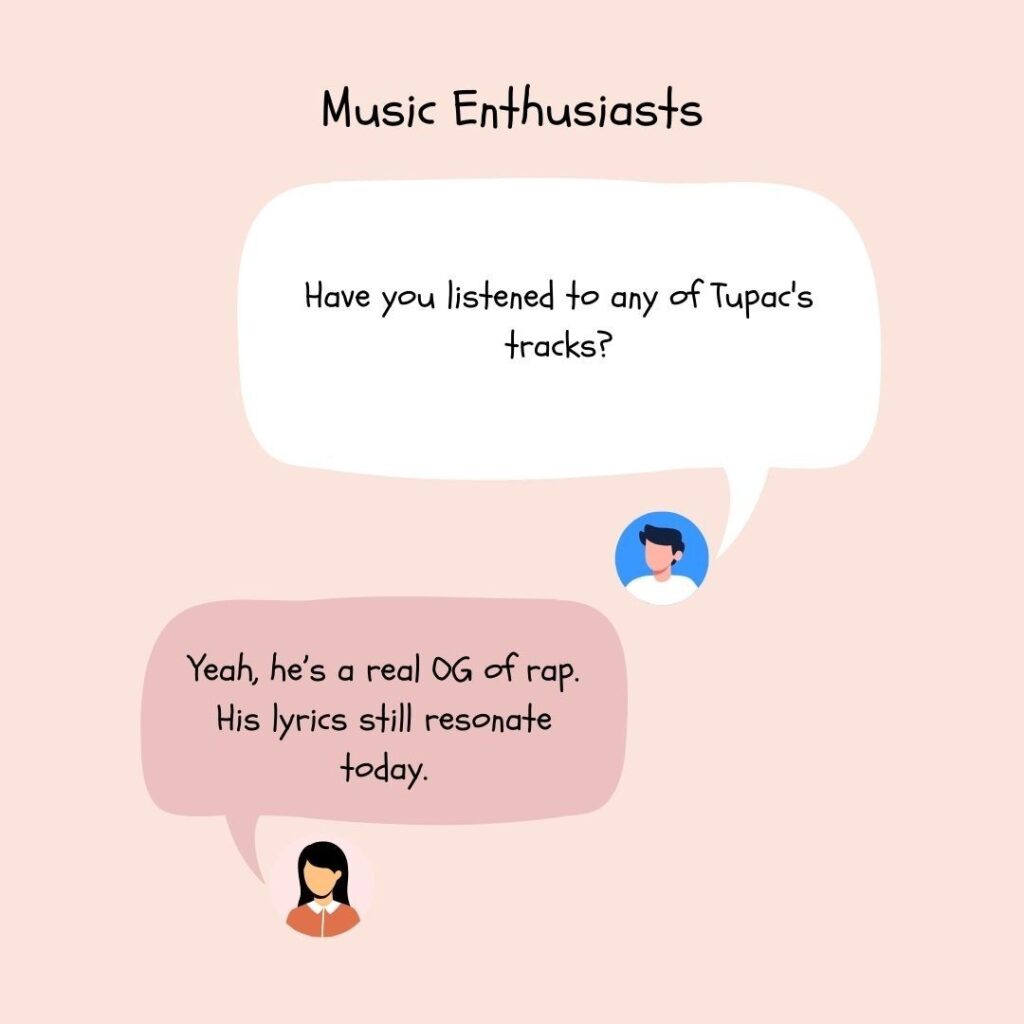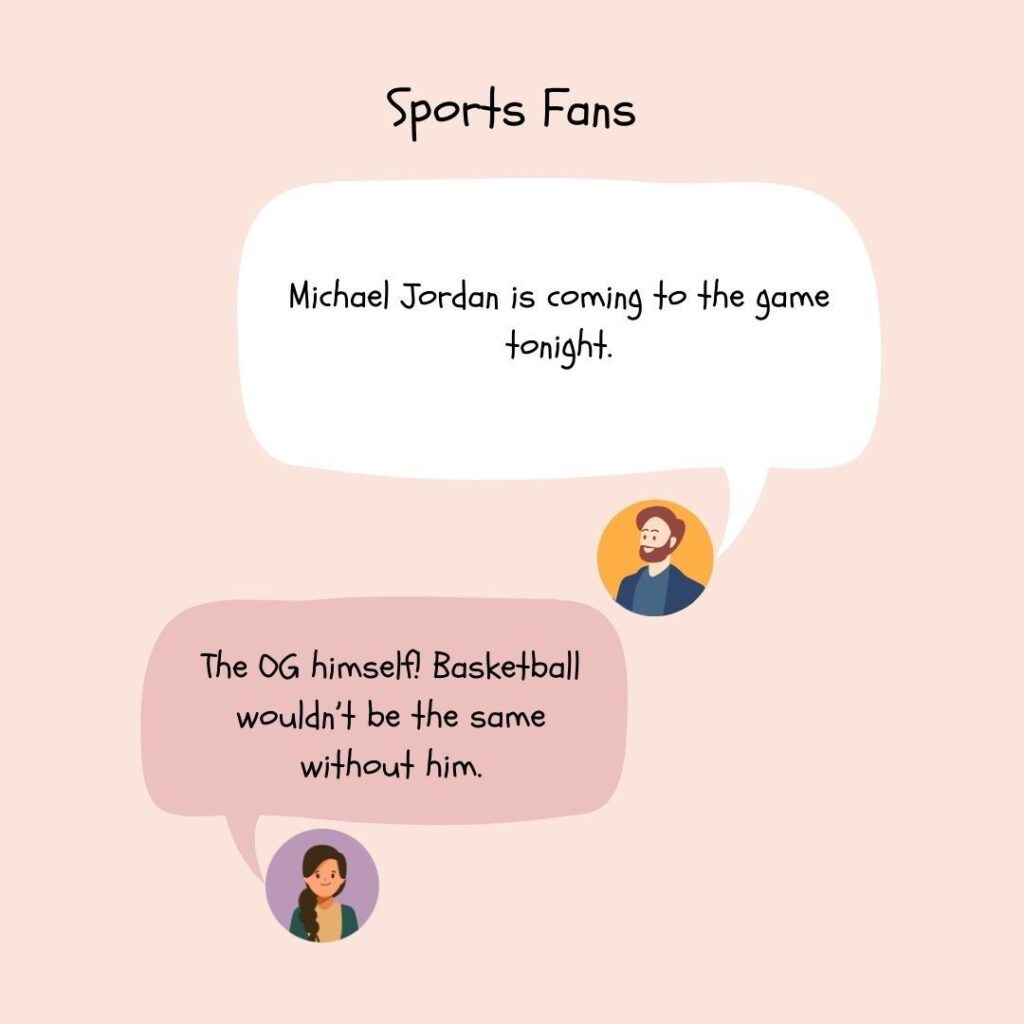Quick Look
- OG Full Form: “Original Gangster”
- Usage: Media, Social Networks
- Origin: 1990s Hip Hop Culture
- Similar: Original, Veteran
- Represents: Authenticity, Respect
Seen the acronym ‘OG’ floating around and wondered what it means? This slang term has evolved rapidly, leaving many confused about its true meaning. Is it just a trendy word or something deeper? And how did it become so ingrained in our communication? Let’s get started and learn more about the origin, definition, and how people actually use OG today.
Outline
Toggle- What Does OG Mean?
- Where Did OG Come from? The Origin
- Alternate Meanings Of OG
- Alternative Acronyms And Abbreviations Of OG In Chats
- Alternative Meanings Of “OG”
- Who Uses OG And Where?
- How To Use OG? (With Examples)
- How To Reply To OG (With Examples)
- Facts About OG
- Other Common Abbreviations Parents Should Know
- FAQs:
- Conclusion
What Does OG Mean?
OG is an abbreviation that has woven itself deeply into modern lexicon, often signifying “Original Gangster.” Originally, it described someone who was notably respected or “old-school” in urban communities, embodying the quintessence of authenticity and reverence. Over time, the term has evolved to broadly imply being the first or best in terms of ideas, actions, or quality.
In contemporary use, calling someone an OG is a nod to their status as a pioneer or a highly respected figure within a certain context. This could range from music and sports to social media influencers who have established a foundational presence. OG conveys a deep respect for someone’s enduring influence or contributions, highlighting their foundational role in shaping what comes next.
Where Did OG Come from? The Origin

The term “OG” originated from the hip-hop community in the United States during the early 1980s, specifically within African American communities on the West Coast. It was first popularized by rap artists who used it to pay homage to gang members who were considered foundational or respected due to their seniority and influence.
The term “Original Gangster” was a badge of honor among these groups, symbolizing a deep-rooted respect for members who had been involved in gang life for a long period and had survived its various challenges.
As hip-hop culture spread globally, the term “OG” was adopted by a broader audience and began appearing in music, movies, and everyday conversation far removed from its original gang-related context. This transition from street lingo to mainstream language marked OG’s evolution into a broader symbol of authenticity and originality.
Today, it is used to refer not only to individuals but also to original items or first editions of products, imbuing them with a sense of authenticity and high value.
Alternate Meanings Of OG
While “Original Gangster” is the most recognized definition of OG, the abbreviation has acquired various alternate meanings across different contexts and communities. One popular interpretation is “Original,” used to signify the first version or an unchanged state of something, particularly in gaming and product branding. This usage underscores the value and authenticity, similar to calling something a “classic” or “vintage.”
In online gaming and internet culture, OG often denotes a player or participant who has been involved since the beginning or who demonstrates a profound mastery or deep understanding of the game or topic. This adaptation reflects a respect for longevity and foundational knowledge.
Another less common but noteworthy usage appears in the medical and botanical fields, where OG can refer to “Ocean Grown” or “Original Green,” often in the context of cannabis culture. This particular meaning highlights the supposed origins of certain strains that were cultivated originally near the ocean, suggesting a pure and unaltered lineage.
Alternative Acronyms And Abbreviations Of OG In Chats
- OGG – Original Gangster Group: Used to reference a group or collective that’s original or foundational in their field.
- OGL – Original Gangster Level: Used to describe someone or something that is at the highest or most respected level within a context.
- OGM – Original Gangster Member: Refers to an original or founding member of a group or organization.
- OGS – Original Gangster Status: Denotes a high status similar to that of an OG, emphasizing respect and authenticity.
- OGE – Original Gangster Edition: Used for products or versions that are considered the first and most authentic.
- OGT – Original Gangster Type: Refers to someone who exemplifies the qualities typically associated with an OG.
- OGP – Original Gangster Personality: Describes a person who embodies the traits of an OG in their demeanor and actions.
- OGA – Original Gangster Attitude: Used to describe someone’s approach or demeanor that reflects the OG spirit.
- OGC – Original Gangster Character: Refers to a person or character in a story or narrative that embodies the OG traits.
- OGQ – Original Gangster Quality: Used to signify something of high quality and authenticity, mirroring the respect accorded to an OG.
Alternative Meanings Of “OG”

- Oh God – An exclamation used to express surprise, frustration, or disbelief.
- Oh Gosh – A milder version of “Oh God,” often used in more polite or less informal contexts.
- Oh Geez – Similar to “Oh God,” used to express a reaction to an unexpected or unwelcome event.
- Original Genius – Praise for someone who comes up with innovative or clever ideas.
- Organic Growth – Used in business and marketing contexts to describe natural or non-paid growth in metrics or audience.
- Orange Grove – Can refer to literal orange groves in agricultural discussions or symbolically to fruitful and productive places or states.
- Only Good – Used to describe something that is purely positive with no negative aspects.
- Old Gold – Refers to something aged and valued, like vintage items or classic traditions.
- Off Guard – Used to describe someone being caught unprepared or in a state of surprise.
- Old Guy/Gal – A friendly or humorous reference to someone who is older or more experienced.
Who Uses OG And Where?
The term “OG” transcends various cultural and social boundaries, making its usage widespread among diverse groups. Initially rooted in the African American hip-hop community, its appeal has broadened significantly. Today, “OG” is employed by people across different ages, backgrounds, and interests.
- Music And Entertainment: Artists and fans often use “OG” to refer to pioneers in their genre, such as OG rappers or musicians who have shaped the direction of their music styles.
- Sports: Athletes and sports commentators use “OG” to describe seasoned professionals who have had long and influential careers in their sports.
- Youth And Online Communities: Teenagers and young adults, especially in online forums and social media, use “OG” to denote someone who has been part of a community or game from the early days and is respected for their longstanding participation.
- Fashion And Lifestyle: In fashion, “OG” can describe someone who sets trends or old-school styles that come back into vogue. It’s also used to refer to the original editions of sneakers or clothing lines, highly coveted for their authenticity and classic appeal.
- Corporate And Technology Sectors: In a more formal setting, tech developers and startups might use “OG” to refer to the original creators of a product or technology, highlighting their pioneering role in innovation.
How To Use OG? (With Examples)
Understanding how to correctly use the term “OG” in conversation can be quite useful, especially as it has broadened its applications beyond its original context. In this section, we offer a few examples of how OG is used in various settings, and a few conversations/dialogues for better understanding.

As A mark Of Respect Or Status:
Example: “You have to listen to Dre’s first album to understand why he’s considered an OG in the rap scene.
To Denote Originality Or Authenticity:
Example: “These are the OG Jordans from ’92, not the reissues.”

To Recognize Longevity Or Foundational Presence In A Community Or Field:
Example: “She’s the OG of our book club, been here since it started in 2005.”
In Gaming, To Refer To Someone With Extensive Experience:
Example: “Mike is an OG in World of Warcraft; he’s been playing since the beta version.”

In Casual, Playful Banter Among Friends:
Example: “You’re such an OG for knowing all these 80s rock bands!”
Dialogue Examples:
Tech Enthusiasts’ Exchange
A: “I just got the latest edition of this phone.”
B: “Nice, but I still prefer my OG model from four years ago. It’s a classic.”
Workplace Legacy
A: “Can you believe Julia is retiring?”
B: “Wow, she’s really an OG. She’s seen all the phases of this company.”
Expertise in Marketing
A: “You should ask Mark for advice; he’s the OG of digital marketing here.”
B: “Yeah, his strategies are always on point.”
Local Favorites
A: “This café is the OG spot for the best espresso in town.”
B: “Agreed, it’s been top-notch since the day they opened.”
Gaming Community
A: “Who’s the OG in this game?”
B: “That would be Sarah; she’s been ranking top since season one.”
How To Reply To OG (With Examples)
Responding to someone referring to you or someone else as “OG” can be seen as a compliment about expertise, authenticity, or a foundational presence. Below are some examples of responses that acknowledge the complement or to continue the conversations meaningfully.
Responses:
- Affirmative Acknowledgment:
- Example: “Thanks for the respect! It’s been a long journey to get here.”
- Modest Denial:
- Example: “I’m just another player here, but I appreciate that!”
- Passing The Respect:
- Example: “I learned from the best—shoutout to the real OGs out there.”
- Jokingly Downplaying:
- Example: “OG? More like old and grumpy these days!”
- Encouraging Others:
- Example: “We’re all OGs in our own ways. Keep pushing forward!”
Dialogue Examples:
Homebrewing Hobbyists
A: “Man, you are the OG of homebrewing in our group.”
B: “Thanks, man! It’s all about sharing what I love. You’ll be brewing like an OG soon too.”
Culinary Praise
A: “Your mom is such an OG when it comes to baking. Her recipes never fail.”
B: “Right? She’s got the magic touch. Learned everything I know from her.”
Professional Recognition
A: “You handled that project like an OG. Impressive work!”
B: “Appreciate it! I’ve had good mentors, just passing on what I’ve learned.”
Gaming Community Acknowledgment
A: “Dave says you’re the OG gamer around here.”
B: “Ha! Maybe just the oldest gamer. But thanks for the shoutout.”
Forum Leadership
A: “You’re the OG of this forum, right?”
B: “I’ve been around, yeah. Always happy to help the newbies find their way.”
Facts About OG
The term “OG” has a rich history and diverse applications that extend far beyond its origins. Here are some intriguing facts about OG that highlight its cultural significance and widespread use:
- Historical Roots: OG originated in the early 1980s within the African American communities, particularly among West Coast rappers. It initially stood for “Original Gangster,” referring to respected members of street gangs.
- Evolution In Meaning: Over the decades, OG has evolved from a term describing seasoned gang members to one that is used across various fields to denote authenticity, originality, and respect.
- Global Influence: The term has been embraced globally, featured in songs, movies, and internet culture, which speaks to its universal appeal and adaptability.
- Cultural Recognition: OG is recognized in mainstream culture, often used in popular media to describe pioneers in music, sports, and other fields.
- Lexicon Entry: The term has been officially recognized and added to several dictionaries as a testament to its widespread use and acceptance in the English language.
- Versatility In Usage: Beyond individuals, OG is often used to describe products, such as the original versions of sneakers or technology, emphasizing their classic and trend-setting qualities.
- Educational Tool: In educational discussions about language and culture, OG serves as an example of how language evolves and how terms can transition from very specific cultural contexts to mainstream usage.
- Symbol Of Respect: Using OG is often a way to express respect for someone’s achievements or status within a particular community, making it a positive affirmation of one’s legacy or impact.
- Frequent Use In Social Media: OG is popularly used in social media and online forums, highlighting the adaptation of street vernacular into digital communication.
- Adaptation In Various Languages: While originally English, variations of OG have found their way into other languages, adapted to fit different cultural contexts while retaining the essence of the original meaning.
Other Common Abbreviations Parents Should Know
In addition to “OG,” there are several other abbreviations commonly used in chats and online communication that parents might find useful to know. These abbreviations can often appear cryptic but are pivotal in understanding the digital communication landscape, especially when keeping tabs on younger family members’ online interactions. Here are 15 such abbreviations:
- GTS – “Go To Sleep”: Often used in casual conversation, especially late at night.
- KYS – “Kill Yourself”: This is a very harsh and potentially harmful phrase that can appear in toxic exchanges.
- KMS – “Kill Myself”: Similar to KYS, this is used to express extreme frustration or despair, often hyperbolically.
- YM – “Your Mother”: Can be used in both humorous and offensive contexts.
- LOL – “Laugh Out Loud”: Used to indicate something is funny.
- BRB – “Be Right Back”: Used when someone needs to leave a chat briefly.
- TTYL – “Talk To You Later”: Indicates that someone is signing off but plans to communicate later.
- SMH – “Shake My Head”: Used to express disbelief or disappointment.
- IDK – “I Don’t Know”: Commonly used in text messaging and online chats.
- IMO – “In My Opinion”: Prefaces a personal opinion.
- TBH – “To Be Honest”: Used to introduce a candid remark or honest opinion.
- FWIW – “For What It’s Worth”: Used to present a piece of information or opinion that might not be of great consequence.
- ICYMI – “In Case You Missed It”: Often used to highlight important pieces of information that might have been overlooked.
- DM – “Direct Message”: Refers to a private form of communication between social media users.
- NSFW – “Not Safe For Work”: Used to label content that is inappropriate for workplace viewing.
FAQs:
While its use is more common in casual contexts, OG can be used professionally to acknowledge someone’s pioneering role or substantial experience in a field.
Yes, referring to someone as an OG is generally considered a compliment, highlighting their respectability, seniority, or authenticity.
You can say, “He’s an OG in the tech industry,” to mean he has been influential and respected in the sector for a long time.
No, OG can also refer to original items or concepts, like the OG version of a software or sneaker model, implying they are the first or most authentic versions.
The opposite could be considered a “newbie” or “rookie,” someone who is new to a particular scene or field.
Generally, OG is positive, but context matters; if used sarcastically, it could potentially carry a negative connotation.
Similar terms include “veteran,” “pioneer,” or “original,” depending on the context.
Originally a term associated with long-time gang members, OG has evolved to broadly signify authenticity and respect across various cultural domains.
Yes, in contexts like cooking or music, OG can refer to traditional, authentic methods considered original or classic.
Conclusion
The term “OG” has journeyed from niche urban slang to a widely recognized expression celebrating authenticity, originality, and respect across various domains. From its roots in the hip-hop culture of the early 1980s to its pervasive use in today’s digital conversations, OG encapsulates more than just a simple acronym; it represents a deep appreciation for foundational influences and enduring legacies. This exploration of OG not only enriches our understanding of language evolution but also underscores the dynamic nature of cultural expressions.
As language continues to evolve, terms like OG remind us of the intricate ways in which words shape, and are shaped by, cultural identities and histories. Whether referring to people, products, or practices, OG remains a powerful testament to the significance of being original and respected in any context.
Related Posts:
- STFU Meaning: Definition, Use Cases, Examples, Facts & More
- ASL Meaning On Social Media: Definition, Use Cases,…
- WTH Meaning: Use Cases, Examples, Facts & More
- YW Meaning: Origin, Use Cases, Examples & More
- OC Meaning: Definition, Use Cases, Examples, Facts
- What Does 'KYS' Really Mean? Origin, Use Cases By…

